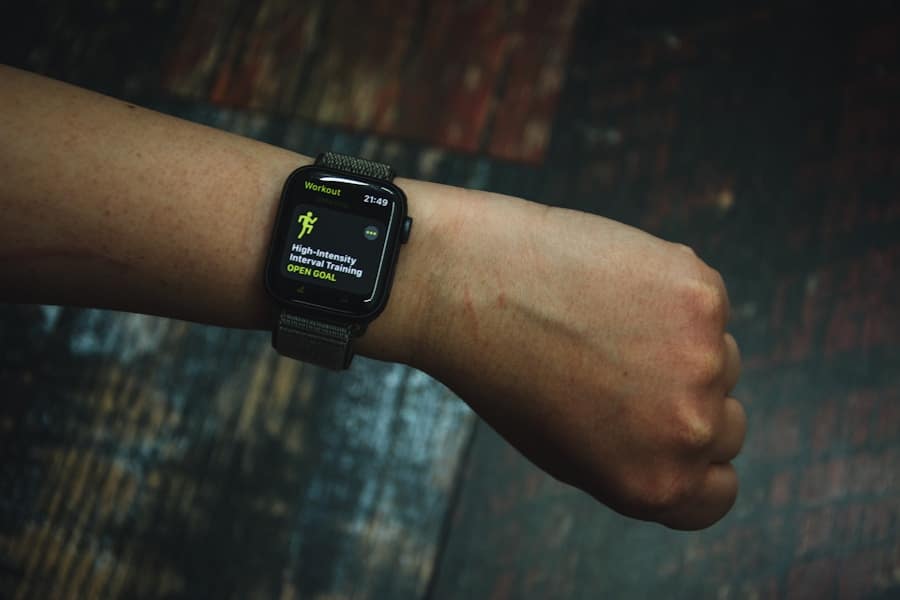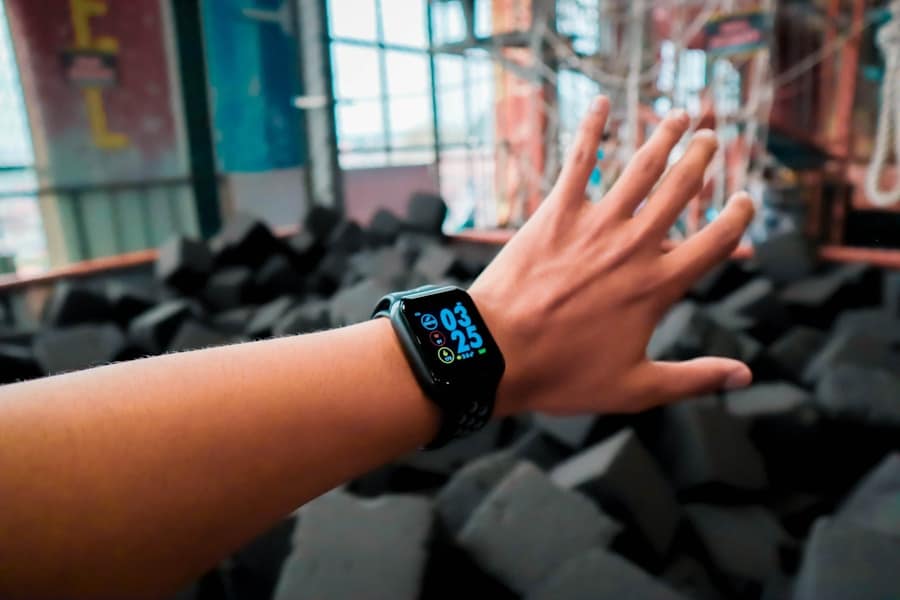The integration of artificial intelligence (AI) into wearable technology has revolutionized the way individuals approach health and fitness. Wearable devices, such as smartwatches, fitness trackers, and health monitors, have evolved from simple pedometers to sophisticated gadgets capable of tracking a myriad of health metrics. With the advent of AI, these devices can now analyze data in real-time, providing users with insights that were previously unattainable.
This transformation is not merely a technological advancement; it represents a paradigm shift in how people engage with their health and fitness journeys. AI enhances the functionality of wearables by enabling them to learn from user behavior and adapt accordingly. For instance, a fitness tracker equipped with AI can monitor a user’s activity levels, sleep patterns, and even heart rate variability to offer tailored recommendations.
This level of personalization is crucial in a world where one-size-fits-all solutions often fall short. As wearables become more intelligent, they are not just passive tools but active participants in the user’s health management, fostering a more engaged and informed approach to fitness.
Key Takeaways
- AI in wearables is revolutionizing the way we approach fitness and personalized health plans.
- AI plays a crucial role in creating personalized fitness plans by analyzing user data and providing tailored recommendations.
- The benefits of AI in wearables for fitness include improved accuracy, real-time feedback, and customized workout routines.
- AI-driven features in wearables, such as activity tracking, heart rate monitoring, and sleep analysis, contribute to personalized fitness plans.
- Despite its potential, AI in wearables for personalized fitness faces challenges and limitations, such as data privacy concerns and accuracy issues.
The Role of AI in Personalized Fitness Plans
Personalized fitness plans are increasingly recognized as essential for achieving health goals, whether they involve weight loss, muscle gain, or overall wellness. AI plays a pivotal role in crafting these individualized plans by analyzing a wide array of data points that reflect a user’s unique lifestyle, preferences, and physiological responses. Unlike traditional fitness programs that may rely on generic guidelines, AI-driven solutions can tailor recommendations based on real-time feedback and historical data.
For example, an AI-powered wearable can assess a user’s current fitness level by evaluating their past workouts, recovery times, and even dietary habits. By understanding these variables, the device can suggest specific exercises, optimal workout intensities, and recovery strategies that align with the user’s goals. This level of customization not only enhances the effectiveness of fitness plans but also increases user motivation by making the journey more relevant and achievable.
How AI Analyzes User Data to Create Personalized Plans

The process through which AI analyzes user data to create personalized fitness plans is multifaceted and involves several advanced techniques. At its core, AI utilizes machine learning algorithms to sift through vast amounts of data collected from wearables. This data can include metrics such as heart rate, step count, sleep quality, and even stress levels.
By employing predictive analytics, AI can identify patterns and correlations that inform the development of personalized recommendations. For instance, if a user consistently experiences elevated heart rates during specific types of workouts, the AI can deduce that these activities may be too intense or not aligned with the user’s fitness level. Consequently, it might suggest modifications to the workout routine or recommend alternative exercises that maintain engagement while promoting safety.
Additionally, AI can factor in external variables such as weather conditions or seasonal changes that might affect outdoor activities, further refining the personalization process. Link: AI in Fitness: How Artificial Intelligence is Changing the Game
The Benefits of AI in Wearables for Fitness
The benefits of incorporating AI into wearables for fitness are manifold and extend beyond mere convenience. One significant advantage is the ability to provide real-time feedback during workouts. This immediate insight allows users to adjust their efforts on the fly, optimizing performance and reducing the risk of injury.
For example, if a runner’s pace exceeds their target heart rate zone, the wearable can alert them to slow down, ensuring they remain within safe limits. Moreover, AI-driven wearables foster accountability by tracking progress over time and offering motivational nudges when users deviate from their goals. This continuous engagement can be particularly beneficial for individuals who struggle with consistency in their fitness routines.
By setting reminders or providing encouragement based on user data, these devices help maintain focus and commitment to long-term health objectives.
AI-Driven Features in Wearables for Personalized Fitness
AI-driven features in wearables are diverse and continually evolving to meet the needs of users seeking personalized fitness solutions. One prominent feature is adaptive workout recommendations that adjust based on user performance and feedback. For instance, if a user completes a series of strength training sessions with ease, the wearable may suggest increasing weights or altering repetitions to ensure continued progress.
Another innovative feature is sleep analysis combined with fitness recommendations. Many wearables now monitor sleep patterns and quality, using this data to inform users about optimal workout times or recovery strategies.
This holistic approach recognizes the interconnectedness of sleep and physical performance, allowing users to optimize their overall well-being.
Challenges and Limitations of AI in Wearables for Personalized Fitness

Data Privacy and Security Concerns
significant concern is data privacy and security. As wearables collect sensitive health information, users may be apprehensive about how their data is stored and utilized. Ensuring robust security measures and policies is crucial for fostering trust among users.
Variability in Data Accuracy
The accuracy of data collected by wearables can vary significantly between devices and manufacturers. Factors such as sensor quality and user compliance can impact the reliability of metrics like heart rate or calorie expenditure.
The Need for Ongoing Advancements
If users receive inaccurate information, it could lead to misguided decisions regarding their fitness plans. Therefore, ongoing advancements in sensor technology and algorithm refinement are essential to enhance the precision of AI-driven insights.
The Future of AI in Wearables for Personalized Fitness
Looking ahead, the future of AI in wearables for personalized fitness appears promising as technology continues to advance at an unprecedented pace.
For instance, wearables may soon incorporate advanced sensors capable of monitoring blood glucose levels or hydration status in real-time, allowing for even more tailored fitness recommendations.
Moreover, as AI algorithms become increasingly sophisticated through continuous learning from user interactions, we can expect even greater levels of personalization. Future wearables may not only adapt to individual preferences but also anticipate user needs based on historical behavior patterns. This proactive approach could revolutionize how individuals engage with their fitness journeys, making it easier than ever to achieve health goals.
The Impact of AI on Personalized Fitness Plans
The impact of AI on personalized fitness plans is profound and multifaceted. By harnessing the power of data analysis and machine learning, wearables are transforming how individuals approach their health and wellness journeys. The ability to create tailored fitness plans based on real-time feedback empowers users to make informed decisions about their workouts and overall lifestyle choices.
As technology continues to evolve, we can anticipate even more innovative features that will further enhance the personalization of fitness experiences. While challenges remain regarding data privacy and accuracy, the potential benefits far outweigh these concerns. Ultimately, AI-driven wearables are not just tools; they represent a new era in personal health management that prioritizes individual needs and fosters sustainable fitness habits.
A related article discussing the best apps for Facebook in 2023 can provide valuable insights into how technology is shaping our daily routines. With the integration of AI in wearables supporting personalized fitness plans, it is essential to stay updated on the latest software and applications that can enhance our overall well-being. To learn more about the best apps for Facebook in 2023, check out this article.
FAQs
What is AI in wearables?
AI in wearables refers to the integration of artificial intelligence technology into wearable devices such as fitness trackers, smartwatches, and other health monitoring devices. This allows the devices to analyze data and provide personalized insights and recommendations for fitness and health.
How does AI in wearables support personalized fitness plans?
AI in wearables can analyze data such as heart rate, activity levels, sleep patterns, and other health metrics to provide personalized fitness plans. This can include tailored workout recommendations, activity goals, and insights into overall health and wellness.
What are the benefits of using AI in wearables for personalized fitness plans?
The benefits of using AI in wearables for personalized fitness plans include more accurate and tailored recommendations, improved motivation and accountability, and the ability to track progress and make adjustments in real-time based on individual needs and goals.
Are there any privacy concerns with AI in wearables?
Privacy concerns with AI in wearables may arise due to the collection and analysis of personal health data. It is important for users to be aware of how their data is being used and to ensure that the wearable device and associated apps have strong privacy and security measures in place.

